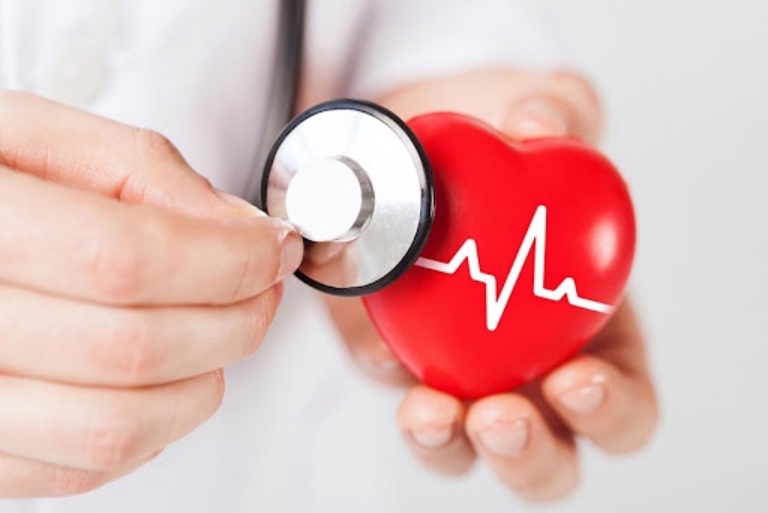Cardiovascular disease can lead to heart attack or sudden cardiac arrest, which can be life-threatening. Most cardiovascular diseases cannot be cured, but they can be controlled and improved with a healthy lifestyle and diet.
Here are 5 things that people with cardiovascular disease should not do
1. People with cardiovascular disease should not eat salty foods
People with cardiovascular disease need to limit their salty diet, because salt and foods rich in sodium are the number 1 enemy of patients with heart disease, which can adversely affect the treatment process and cause many complications.
Eating a lot of salt increases vascular tone, vasoconstriction, increases peripheral resistance and leads to high blood pressure. This is one of the risk factors for coronary artery disease. Therefore, if you eat a lot of salt, your disease will become more and more serious.
Eating a lot of salt will increase the risk of water retention in the body, causing adverse effects on the cardiovascular system, especially in patients with heart failure.
In addition to affecting the cardiovascular system, eating a lot of salt also affects many other organs in the body such as increasing calcium excretion through urine, easily causing osteoporosis, kidney stones; increases the risk of peptic ulcer disease, increases the burden on the kidneys causing kidney failure… Thus, a low-salt diet is the solution to help you control blood pressure, avoid swelling, and improve shortness of breath.
The recommended amount of sodium in each meal for patients with cardiovascular disease is no more than 2,000mg, preferably less than 1,500mg. For patients with severe heart failure, salt should be completely eliminated from the menu.
How much salt intake should be limited depends on the specific condition. Normally, people with cardiovascular disease should not eat more than 6 grams of salt per day. If you are a salty eater, change your habits and practice eating less salty foods. In particular, you should not use other types of dipping sauces such as fish sauce and soy sauce.
Similarly, you should avoid processed foods because they are often high in salt, such as: Canned foods, cold cuts, bacon, sausages, french fries, fried chicken, snacks, biscuits, salty pastries and other fast foods.

People with heart disease should not eat salty foods.
2. People with cardiovascular disease should not eat sweets
Sugar includes sweet cakes, candies, soft drinks… people with cardiovascular disease should limit their use. People with cardiovascular disease are very susceptible to diabetes, especially those who have a diet high in sugar but low in fiber and are lazy to exercise. In addition, adding a lot of sugar will increase blood sugar levels, increasing the risk of inflammation in people with heart disease.
Therefore, you should not eat sugar and sweet foods such as soft drinks, soda, sweet tea, ice cream, sweet cakes and any foods with added sugar. Bottled fruit juice or fruit juice is also not a good choice for people with cardiovascular disease, even if they do not add sugar.
3. People with cardiovascular disease should not drink a lot of alcohol
Some studies suggest that drinking a glass of wine a day can bring some health benefits to the heart. But when you have cardiovascular disease, drinking alcohol is not good for your heart.
Men should not drink more than 2 cans of beer, 300ml of wine or 100ml of spirits per day. Women should not drink more than 1 can of beer, 150ml of wine or 50ml of spirits per day.
However, it is best to say no to alcoholic beverages if you have cardiovascular disease.

People with heart disease should not stress.
4. People with cardiovascular disease should not smoke
Quitting smoking is very important for your health whether you have heart disease or not. Cigarette smoke is very harmful to the heart, lungs, liver and respiratory system. It is one of the causes of cardiovascular and coronary artery disease.
Smoking increases blood pressure and increases the risk of blood clots by reducing oxygen cells in the blood, which is a prerequisite for heart attacks, myocardial infarction and stroke.
Remember that passive smoking is also a high risk factor. Therefore, avoid exposure to smoke from smokers
5. People with cardiovascular disease should not be stressed
Stress can trigger or worsen a rapid heartbeat. For people with cardiovascular disease, stress can have very negative effects on health. Therefore, you need to limit anxiety and stress. Take a break and take a nap if you feel too tired. Some ways to reduce stress are deep breathing, aromatherapy, yoga or meditation.
Diet and lifestyle for people with cardiovascular disease
Controlling risk factors for cardiovascular disease and moderating diet are important principles in the prevention and treatment of cardiovascular disease. In the diet and lifestyle to prevent and treat cardiovascular disease, it is necessary to pay attention to controlling body weight; Healthy diet such as: Should use vegetable oil (olive oil, soybean oil, sunflower oil, rapeseed oil …) instead of animal fat. Choose foods rich in protein and low in fat: Lean meat without skin or fat, poultry, fish of all kinds, especially deep-sea fish rich in Omega 3, good for heart health, non-fat or low-fat milk, beans and legumes…
Choose whole grains that are not thoroughly polished such as brown rice, germinated rice, barley, brown bread, black bread… which contain lots of fiber, vitamins and minerals to help regulate blood pressure and the heart.
You should limit salty foods, reduce salt, seasoning powder, fish sauce, soy sauce. Limit foods high in salt such as fish sauce, dried fish, pork roll, soy sauce, fermented bean curd, pickles, and vegetables, with no more than 5g of salt per day.
Change your lifestyle
In addition, you should increase physical activity and practice sports appropriate to your age and health condition. Light forms of exercise suitable for cardiovascular disease include walking, cycling, swimming, aerobics, housework, and gardening…





